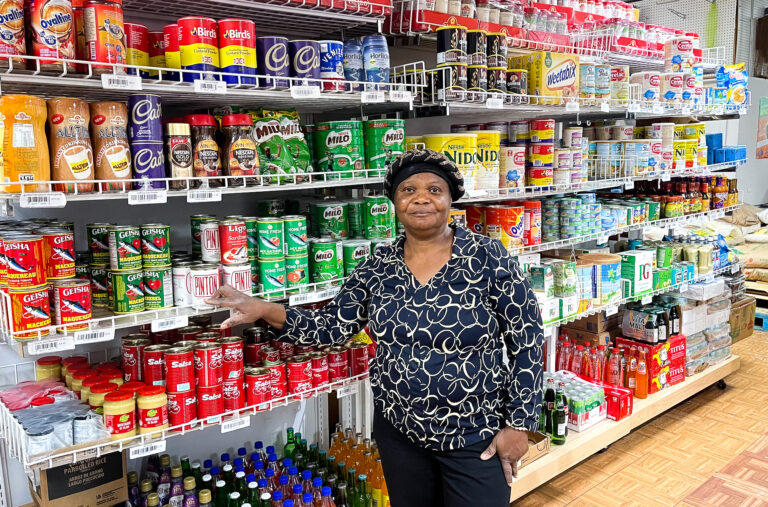When Nana Adwoa Agyapong arrived in Phoenix from Ghana in early August to begin a graduate program at Arizona State University (ASU), she was overjoyed. As the airplane came to a stop at the ramp at Sky Harbor Airport, she bent her head and said a silent thankful prayer to God.
Getting a master’s in Criminology in the U.S., with the world’s biggest economy, was her dream for six years. Agyapong grew up in a gang-dominant environment in Krofrom, a suburb of Kumasi, Ghana. She saw young boys and adults engage in armed robbery, cultism, harassment, drugs and even murder. She wanted to understand why they engage in illegal and violent activities.
Agyapong’s joy faded a bit when she was taken to an African store in Tempe, a city within the Phoenix metropolitan area and where the main ASU campus is located, to stock up on familiar foods before classes began. As a Ghanaian, she knew the cost of living in the U.S. was higher, but the effects of inflation made the difference even more stark.
According to Living Cost, the average monthly cost of living in Ghana is $540, which is 77% less than in the United States, which is $2317. Ghana is ranked 171st in the list of the most expensive countries in the world while the United States is ranked 8th.
On a sunny Saturday afternoon, Agyapong visited Ako International Market, an African store near the ASU Tempe campus. She bought several Ghanaian foods such as Banku and Kenkey, made of corn and cassava dough. Unfortunately, she did not buy all she needed because of the high price of the items, which was beyond her budget.
“Things at the African store were expensive,” she said. “The cost of living here is very expensive for international students. If you consider the price of the items at the African store and the items in Ghana, the difference is ridiculous. What should cost me $1 costs me $10 here.”
The United States is one of the top destinations for education for international students from Africa, Asia, and other parts of the world. According to Open Doors, about 948,519 international students studied in the United States during the 2021/22 academic year, which is an increase from the previous year.
However, the increase in the cost of living, especially food and rent, is making things difficult for international students who struggle to adjust. According to the U.S. Government Accountability Office, inflation contributes to the cause of the rise in the price of groceries.
High rate of inflation
According to the U.S. Bureau of Labour Statistics (BLS), the Consumer Price Index for All Urban Consumers (CPI-U) rose to 0.6% in August on a seasonally adjusted basis, after increasing 0.2 percent in July. It said the all-items index increased to 3.7% in August from 3.2% in July. BLS also said food prices in Arizona increased by 4.9 percent and energy prices by 4.5 percent.
That has left international students struggling to adjust.
“I’ve not been able to buy all the food items I need because it is too much money,” Agyapong said. “My best option is to find someone coming back from my country and let them get foodstuffs there and the person brings it here for me.”
Hyuntaek Lee immediately felt the higher prices when he returned to Arizona this year to pursue graduate studies at the Walter Cronkite School of Journalism and Mass Communication, after a year in his native South Korea.
“The cost of living is going up. Petroleum prices are very high. Rent is also going high and it is hard for international students,” he said.
Not only are students affected by inflation, but international African and Asian stores around ASU campuses providing goods to international students are also severely affected. They say students are cutting back on groceries due to the increase in prices.
“Inflation has affected my business very badly,” said Florence Amoako, the CEO of Ako International Market. “People are not able to shop as they used to shop. Inflation has made people think twice before buying food items. Before, students can shop as much as they want. But because of the increase in prices of goods, it is hard for them to buy more.”
Amoako specializes in African products and has been in business for the past 21 years. She is facing rising costs due to higher shipping fees.
“We are paying twice the amount we spent on imports. The airlines and shipping containers are taking the profit. We retailers are not making much. You still need to bring the products. If you do not sell, you will be out of business and will lose your customers,” she said.
According to the Drewry World Container Index, global container freight rates for August stood at 1,832 from 1,575 in July and 1,494 in June 2023. Bloomberg said the costs for shipping from Shanghai to Los Angeles reached $2,322 per 40-foot container unit in the first week of August, which is an 11.3% increase from the previous week and the fifth straight increase.
Amoako said since the rise in inflation, her monthly revenue has been severely affected.
“If I compare my previous monthly income or the revenue we used to get, it has decreased by 30%. Students are suffering because they are not able to buy as much as they want,” Amoako said.
Rent takes a large chunk of the monthly income
Agyapong, Lee, and Amoako have attributed the increase in rent as the major factor affecting their purchasing power in buying food items and groceries they need. According to Phoenix Business Journal, the median rental price in Phoenix increased 46% over the last year.
When Agyapong began to look for an apartment in Downtown Phoenix, which is closer to the Watts College of Public Service and Community Solutions where she studies, she was shocked by the amount of money she was being asked to pay for rent ⸺ money she could use to pay for two years of rent in Kumasi, a city in Ghana, where she lives. In Kumasi, rents are paid annually unlike in the U.S., where rents are paid monthly.
“They asked me to pay for three months upfront and each month’s rent was $1,500 and I had to pay every month. I was expected to pay $4,000 to move in and after that month, I have to be paying $1,500,” she said.
Agyapong also works as a graduate assistant at ASU Watts College and receives monthly stipends. She notes that rent takes a chunk of her stipend.
“When you look at what the monthly stipend is, I am virtually spending everything on rent. I pay more than 50% on rent monthly,” she said.
Lee feels the pain as well. “Phoenix is a big city and I can understand. It is a rising city and a rising economy. There should be a kind of affordable apartment or housing for international students, but it is hard to find here in Phoenix. It can be a big problem.”
Still, students feel the need to prioritize rent even over food, store owner Amoako said.
“Here in America, if you do not pay your rent, they kick you out. People are concentrating on putting their money on rent more than food,” she said. “If you used to buy $200 worth of food, now you have to buy only $100 because you have to spend more money on the rent and save for the rainy days. So people are thinking twice because they do not want to be homeless.”
Both Agyapong and Lee say ASU and the state government can help students reduce the financial burden caused by the rise in the price of rent and groceries by providing cheaper stores on campus so students can buy cheaper groceries.
“Items in campus stores are more expensive than others. The schools need to focus on reducing living costs for international students,” Agyapong said.











